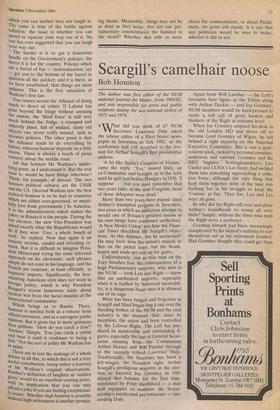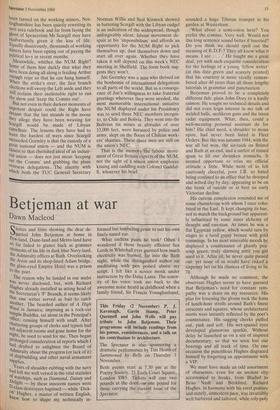Scargill's camelhair noose
Bob Houston
The author was first editor of the NUM national journal the Miner, from 1969-82, and was responsible for press and public relations during the two national strikes of 1972 and 1974.
What did you think of it? NUM Secretary Lawrence Daly asked the labour editor of a Fleet Street news- paper in Inverness in July 1982, as the conference hall still throbbed to the ova- tion for Arthur Scargill's first presidential address.
'A bit like Stalin's Congress of Victors,' came the reply. 'Yes,' mused Daly, an ex-Communist and brought up in the faith until he quit just before Hungary in 1956. 'I suppose . . . but you must remember that two years later, at the next Congress, most of those delegates were dead.'
More than two years have passed since Arthur's triumphal progress in Inverness, two years in which an audacious attempt to mould one of Britain's greatest unions in his own image have continued unchecked. 'A New Model Union' was how the Finan- cial Times described Mr Scargill's objec- tives. At this distance, has he succeeded? He may have won the union's muscle to flex on the picket lines, but the heads, hearts and souls are still up for grabs.
Unfortunately, just as wise men on the Tory benches fear the consequences of a huge Parliamentary majority, wise men in the NUM — both Left and Right — know that an unchecked majority, especially when it is fuelled by 'historical inevitabil- ity, is a dangerous beast once it is allowed out of its cage.
What has been fudged and forgotten as Scargill and MacGregor slug it out over the bleeding bodies of the NUM and the coal industry is the memory that, since its inception, the union had been controlled by the Labour Right. The Left, has pro- duced its memorable and outstanding fi- gures, especially the line of General Secre- taries running from the Communists Arthur Homer and Will Paynter through to the recently retired Lawrence Daly. Traditionally, the Secretary has been a left-winger, the President right. Arthur Scargill's prodigious majority in the elec- tion to succeed Joe Gormley in 1981 altered that balance for the first time, reinforced by Peter Heathfield — a man well equipped to maintain the Secret- aryship's intellectual pre-eminence — suc- ceeding Daly.
Apart from Will Lawther — the Left's favourite hate figure in the Fifties along with Arthur Deakin — and Joe Gormley, NUM members would be hard-pressed to recite a roll call of great leaders and thinkers of the Right at national level.
When Joe Gormley emptied his desk in the old London HQ and drove off to become Lord Gormley of Wigan, he left behind a right majority on the National Executive Committee. But it was a quar- relsome pack, racked by personal enmities, ambitions and vanities. Gormley and his NEC 'bagmen', Nottinghamshire's Len Clarke and COSA's Les Story, had welded them into something approaching a cohe- sive force, although the only thing that kept them together most of the time was backing Joe in his struggle to keep the 'Comms' at bay. Then Joe, Len and Les were all gone.
So why did the Right roll over and allow Arthur's roundheads to stomp all over them? Simply, without the three wise men the Right were a pushover.
Gormley himself had been increasingly exasperated by his faction's inability to sort themselves out as his retirement loomed. Had Gormley thought they could get their act together, he would have retired early. The 'Will-he-retire-won't-he?' game that the NUM President played with Fleet Street in those last few years was as much a product of that despair as it was of the press's appetite for a story. When the petty squabbling resulted in three right candi- dates opposing Scargill for the Presidency, Gormley by then had had more than enough and had left them to their own devices, which were precious few in the wake of Scargill's inevitable and resound- ing victory.
With the prestige of the Presidency added to their infinitely superior organisa- tion, the Left licked its lips at the thought of righting all those injustices that had been inflicted in decades of permanent opposition on the National Executive. But the opposition melted away as a spate of retirements in what had been right 'rotten boroughs' produced leftish successors in the wake of Scargill's success.
Devoid in the main of ideological com- mitment or backbone, these smaller areas had tended to form a dithering centre in the NUM when the industrial chips were down. It was to them that Lawrence Daly directed his powers of persuasion in the build-up to the 1972 stoppage when the Right still held a more than ample NEC majority under Gormley, himself highly reluctant to invoke the strike weapon.
In 1982, there was no need for persua- sion. There were no obstacles to the Left's ambitions, so they were ignored. Area
ballots that produced majorities against strike action could be ignored, too. Warn- ings produced by the failure to win a majority in two national ballots could be consigned to the dustbin of history. 'We, will not be constitutionalised out of action,' said vice-president Michael McGahey, dis- interring a phrase he first used at the Aberdeen Conference in 1971 that pre- ceded the first miners' strike the following year. As everybody knows, they weren't, and the march towards the Left's Holy Grail of a national strike was begun.
The tactic stalled when it ran headlong into what the Left has always considered the bastion of reaction, Nottinghamshire. The ghost of `Spencerism', the 'company union' that replaced the old MFGB in the majority of the county's pits in the Thirties, had risen to spoil the Left's victory.
But was it just Spencerism that promp- ted the Notts miners' stubborn refusal to be swept out on strike in a spontaneous outburst of class solidarity? The area presi- dent and one of its two NEC members is Ray Chadburn. He had been one of Gormley's hopes for the succession, whisked onto the TUC General Council 10 double-quick time when he took over from the retired Len Clarke. But Clarke, despite once being described by a bitter left col- league on the NEC as an 'old-fashioned Labour right wing thug', had cut his trade union teeth on fighting Spencerism in Nottinghamshire and in particular at his own pit, Mansfield, in the Thirties. As his nominated successor, Chadburn, and his left area secretary, Henry Richardson, bridle at any suggestions of Spencerism. Could it be that a combined chorus of `Spencerite scabs' is yet another substitute for clear thought within the power centres of the NUM, especially when more than half the coalfield's current workforce are not 'native'? Many of those men have come through two, three, often more pit closures in other coalfields before coming to rest in comparatively bounteous Not- tinghamshire. As the national vice- president is adamant about not being `constitutionalised out of action', why should they not be as bloody-minded about being 'unconsfitutionalised' into it? Will Paynter's greatest achievement, the National Power Loading Agreement (NPLA) in the mid-Sixties, brought some coherence to the industry's wildly varying piece-rate system. Under the famous 1974 Plan for Coal, the NUM had agreed to introduce a 'meaningful' incentive scheme. In 1977, they did at area level, despite a national ballot rejecting it and after Gorm- ley had shown a respect for the rulebook akin to Scargill's. As a result, the rich Nottinghamshire coalfields were soon back where they had been before Paynter's NPLA — at the top of the industry's earnings league. It takes no special degree of political or industrial insight to recognise that they weren't about to jeopardise that for a strike that had been called without a national ballot.
While the scorn and fury of the Left have
been turned on the working miners, Not- tinghamshire has been quietly rewriting its OWn area rulebook and far from laying the Oiost of Spencerism Mr Scargill may have inadvertently given it the kiss of life. Equally disastrously, thousands of working miners have been opting out of paying the Political levy in recent months.
Meanwhile, whither the NUM Right? Some of them hint darkly that what they have been doing all along is feeding Arthur enough rope so that he can hang himself. When the strike's over, the first branch elections will sweep the Left aside and they will reclaim their inalienable right to run the show and 'keep the Comms out'.
But not even in their darkest moments of impotent despair could the Right have dreamt that the last strands in the noose they allege they have been weaving for Scargill would be made of Libyan camelhair. The lessons they have had to learn the hardest of: ways since Scargill succeeded Gormley is that the custody of a great national union — and the NUM is closest to that cherished ideal of an indust- rial union — does not just mean 'keeping °Ilt the Comms' and grabbing the plum overseas delegations. The alacrity with Which both the TUC General Secretary
Norman Willis and Neil Kinnock showed in battering Scargill with the Libyan cudgel is an indication of the widespread, though unforgivably silent, labour movement de- spair at his 'ilnpossibilism' and affords an opportunity for the NUM Right to pick themselves up, dust themselves down and start all over again. Whether they have taken it will depend on this week's NEC meeting in Sheffield. The form book sug- gests they won't.
Joe Gormley was a man who thrived on the bonhomie of international delegations to all parts of the world. But as a consequ- ence of Joe's willingness to take fraternal greetings wherever they were needed, the most memorable international initiative the NUM displayed under his Presidency was to send three NEC members incogni- to, to Chile and Bolivia. They went into the Bolivian tin mines at altitudes of over 13,000 feet, were harassed by police and army, slept on the floors of Chilean work- ers' shanties. These three men are still on the union's NEC.
That is the memory the labour move- ment of Great Britain expects of the NUM, not the sight of a senior union employee kissing and cuddling with Colonel Gaddaf- fi, whatever his brief.












































 Previous page
Previous page